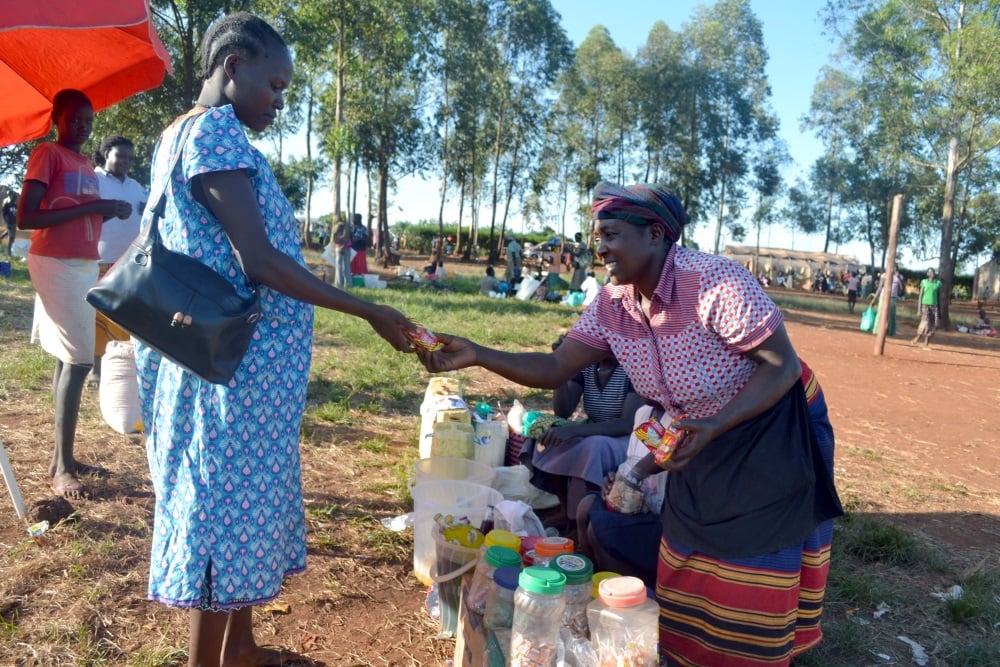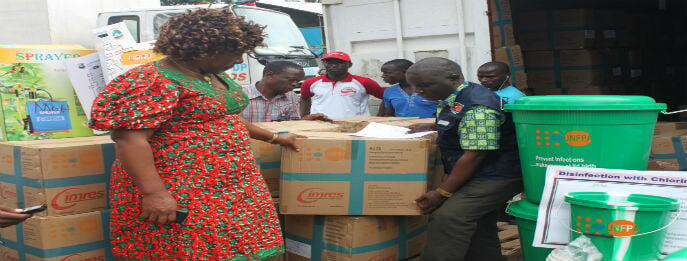Monrovia, Liberia. The outbreak of Ebola Virus Disease (EVD) in March 2014 is challenging the way people work. All development programs initiated by the United Nations, Civil Society Organizations, Non-Governmental Organizations and the authorities have been suspended. In the meantime, UNFPA is providing support to the Government and the people of Liberia
Lofa County, in northern Liberia is the epicenter of the EVD. However, sporadic spread is beginning to be almost in every county. In order to eradicate Ebola from the country, on 6 August 2014, President Ellen Johnson Sirleaf declared a State of Emergency, effective immediately for a period of 90-days.
A National Task Force was established to prevent further spread of the virus. Among other measures put in place: stay home for all non-essential government staff for a determined period, schools to remain closed and fumigation of all public buildings. Moreover, a shutdown of markets in affected areas, restriction on movement and mandatory cremations has been enforced to limit contact with the dead and to avoid contamination of water sources.
Senatorial elections planned for October have also been postponed to December 2014.
Early support from UNFPA
UNFPA has been supporting the efforts of government of Liberia since the infection was first detected in the country. During the first wave of the infection which lasted 3 weeks between March and April, UNFPA printed and distributed 15,000 brochures and 1,000 case management posters to raise awareness among the people and urge them to adopt best practices to curb the disease.
Since the second wave of the EVD, which started in May, UNFPA has committed a total of USD 239,000 to the efforts of government and people of Liberia. Thus, based on its mandate, UNFPA is currently targeting to help a population of 660,000 in five Counties -Bomi, Bong, Lofa, Margibi and Montserrado- through 75 health facilities and training and equipping 600 midwives to help deliver babies safely without contamination. These health workers are being provided with universal precaution kits, reproductive health kits, gynecological gloves, rape kits, clean delivery reusable kits, clean delivery drugs and equipment; materials for management of miscarriage, referral level equipment and referral level drugs and blood transfusion sets.
In addition to providing these life-saving commodities to the Ministry of Health (MoH), UNFPA has been directly distributing much of these materials to health facilities in Montserrado, Bong and Bomi Counties, including a huge supply to the Maternity wing of JFK Teaching Hospital in Monrovia.
With regards to logistics and human resource deployment, UNFPA has deployed staff to support MoH in the training of health workers in Montserrado County, contact tracing with the Liberian Institute of Statistics and Geo-Information Services and support to an Ebola prevention program in District 17 Community.
The challenge of more health workers affected
Among the three countries greatly affected by the Ebola outbreak, Liberia has reported the highest number of health workers that have contracted the disease so far.

Eight out of 15 counties have had health workers exposed to or infected with the Ebola disease.
Among challenges brought by EVD, women and children have poor access to reproductive, maternal and child health services. The plight of pregnant women and children remain a major concern for the public health organizations, agencies as well as the MoH. Fear of contracting the infection among health workers and their immediate families have grossly resulted into limited across to maternal and child health services in all counties affected by the outbreak and there are reports that pregnant women are being abandoned at health facilities.
It is more and more evident that the usual great need for adequate supply of gloves, protective clothing, and disinfectants for health workers has become a dire need now more than ever.
Recently, a spokesman for the World Health Organization said thousands more health workers were needed to fight the virus in the region.



